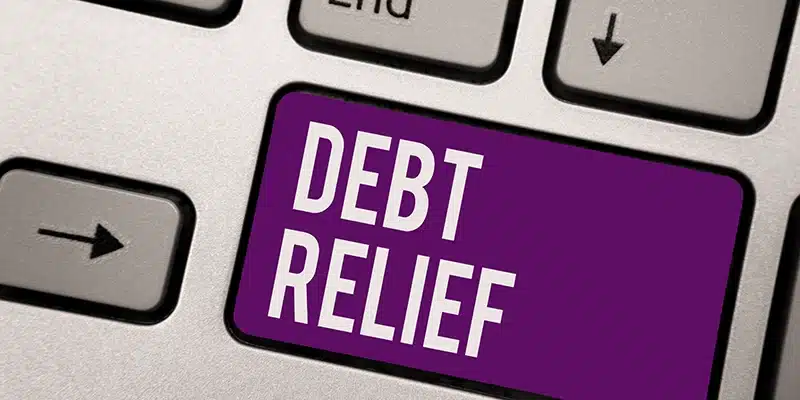Too Much Debt to Divorce: What You Need To Know
Posted on June 15, 2021 in Debt
Do you think you have too much debt to get a divorce? There’s never a good time to have too much debt. Few people enjoy owing money, especially if they have difficulty paying. While it may add insult to injury to deal with debt in the midst of a divorce, it’s also something that can’t be removed. When a couple is dealing with divorce and debt, the last thing they need is question marks about their assets and finances. Thus, paying off your debts will significantly reduce the anxiety and debt burdens during a divorce. If you think you might have too much debt to get a divorce, know that there are solutions that can solve debt issues before a divorce is finalized.
How Do You Get A Divorce With A Lot Of Debt?
Do you think you have too much debt to divorce? Couples can consider bankruptcy, debt consolidation or debt settlement as three viable options for dealing with divorce and debt. They can look at how to protect themselves financially after their marriage ends, including how to communicate about debts that are still owed jointly. Before they do any of these things, however, divorcing couples should examine the amount of their debt, and consider who actually owes each payment and how they will split responsibilities. Whether the divorce is amicable or acrimonious in nature, every decision ultimately starts from there.

How Do You Calculate Who Is Responsible For Specific Debts?
When you think you might have too much debt to divorce, always start with the common law and work your way from there when it comes to determining who is liable for the debt. If you signed an agreement with a lending institution or other creditor, that debt belongs to you, no matter who’s been paying it. In a divorce settlement a judge may assign one spouse or another to have more liability for paying a debt. The creditor is under no obligation to respect that decision.
More importantly if one spouse stops paying, the other side has no recourse unless some binding agreement backed by finances or law (or both) has previously been reached to address that possibility.
Considerations about Divorce and Debt
When considering the law you must realize not all states treat marriage or divorce the same way, especially property states. A few states consider all assets to be ‘community property’. Some states, even if they allow property to be split, will allow a judge to determine ownership and liability according to other criteria. To be safe you should check your state law, and get a legal professional to help you through divorce and debt issues. Whatever you discover, try to determine debt responsibilities before the split.
Legal Rights When You Have Too Much Debt to Divorce
You should also know your legal rights once the divorce is final. As hinted at earlier, many joint accounts remain in force even after the marriage ends. That means a bankruptcy or non-payment by one spouse will affect the credit of the other. This is true of house notes, car notes and even credit cards. Unless your name is legally separated from the debt, your change in marital status doesn’t exempt you from payment. This means that unless you work to pay off the balances, your credit score may be affected.
What Are Some Debt Relief Options Prior To Divorce?
The old saying about an ounce of prevention certainly applies when it comes to debt and divorce. As hard as it is to juggle finances during an uncertain time, it’s even harder when both parties have gone their separate ways. If you believe you have too much debt to divorce, consider the following three financial management options a couple has to lower their debt and liabilities:

1. Debt Settlement
Paying off your debts is the surefire way to end all doubt. That debt relief option should be taken whenever it’s available. Unsecured debts, such as credit cards and high-interest loans, should be paid first. Next comes revolving debt, such as lines of credit; then finally fixed payment debts, such as student loans, car loans and house notes. No matter whose name is officially responsible for paying a debt, they should make sure neither party has any liability when the final payment is made.
2. Debt Consolidation
Aside from being a great way to combine outstanding debt, consolidation is also a way to remove one spouse’s name from debt responsibility. During divorce debt consolidation, often it’s agreed that one spouse or the other shouldn’t be responsible for certain payments after the marriage. The couple can refinance and consolidate debts into a legal arrangement that only bears the responsible party’s name. Not only can this method help split the assets, divorce debt consolidation can start a new credit path for whoever has their name on the new debt.
3. Bankruptcy
If there isn’t enough money to pay down a debt, bankruptcy may be the only option for a clean break. The process shouldn’t favor one party or the other unduly. If it will be financially crippling or burdensome, then bankruptcy probably isn’t the solution if you have too much debt to divorce. Filing for bankruptcy usually affects larger assets the most. Its aftermath, however, will have an impact on all the divorcing couple’s finances. Every aspect should therefore be considered for such a major move. It doesn’t help to mitigate debt if you simultaneously destroy opportunity.
related: my parents are in so much debt: how can I help?
Frequently Asked Questions About Divorce And Debt
How do I get a divorce with a lot of debt?
Debt shouldn’t be a reason not to divorce. If you think you have too much debt to divorce, know that there are many legal and financial remedies to manage debt both during and after divorce. Debt Settlement, Debt Consolidation and Bankruptcy are just three of these methods. Divorce decrees can be tailored to manage your financial situation after the divorce.
Is it better to pay off debt before divorce?
Yes. Paying off debt before a divorce and managing finances with someone who’s no longer in your life is fraught with financial peril, particularly if the divorce is acrimonious.
How is credit card debt split in divorce?
If a credit card is not in your name, you usually won’t be held responsible for payment once your marriage ends. Joint credit card debt can pose a problem and influence both party’s credit report. Most states consider them the responsibility of both spouses regardless of who is paying the bill to the credit card company.
Is personal debt shared in divorce?
It depends upon the individual state’s law. Several states consider all assets to be communal property. Also, if your name is on a loan or other debt-incurring agreement, you will be liable, whether it’s ‘your’ debt or not.
What happens if one person on a mortgage files bankruptcy?
As long as your name is on a mortgage loan, you are responsible for payments, regardless of your marital status. If your ex-spouse files for bankruptcy, they may be exempt from payment, but you will not.
How Does Divorce Affect Debt?
The court divides the couple’s debts and assets as part of the divorce judgment, as well as who is responsible for paying specific bills. Each state has its own laws governing the division of debts and assets. Some states take into account the assets and debts that each spouse brought into the marriage.
How Do You Get A Divorce With A Lot Of Debt?
Marital debt is never a good reason to put off a divorce. If a marriage is over, it’s best for the involved parties to move forward with the divorce and debt process. There’s no question you should be mindful of your finances, especially if you feel like you have too much debt to divorce. Single income households are financially less capable than a home with two bread winners. When dating someone with debt, there’s no back-up for emergencies or someone with extra money waiting in the next room.
If you plan ahead, however, that new life doesn’t need to be so frightening or intimidating. Paying off your debts reduces your debt burden significantly during a divorce. Get help from a divorce debt attorney or other professional service and look out for your interests with an eye to the future. Bore the divorce, handle as much of the joint debts as you can and have clear rules in place for what comes afterwards. Chances are if you approach the situation with your eyes wide open, you’ll like what you see coming down the road.
Related blog posts
Need expert financial advice?
Let TurboFinance connect you with the best consulting services and resources to help you take control of your finances and find a path to build wealth.
Get A Free Consultation Today!